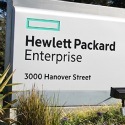
American IT giant HPE has piled additional pressure onto UK Prime Minister Boris Johnson over a looming decision about excluding China's Huawei from the UK's 5G market.
In a letter dated June 7 and seen by Light Reading today, Marc Waters, the managing director of HPE's UK and European operations, said new 5G options meant there were "fewer reasons to include potentially unsafe technology in UK networks."
While the letter does not mention Huawei by name, the reference to "unsafe technology" comes as UK politicians and US officials urge the government to ban the Chinese supplier on security grounds.
The long-running concern is that Chinese authorities are using Huawei equipment to spy on other countries – charges Huawei has repeatedly denied.
In January, the government proposed a compromise under which Huawei would be restricted to just 35% of any 5G network and 35% of a full-fiber one.
That did not go far enough for critics, but UK operators that rely heavily on Huawei equipment say a complete ban would endanger the UK's 5G prospects and force them to spend "hundreds of millions" in rip-and-replace costs.
Banning Chinese vendors, they add, would hurt competition in a mobile infrastructure market dominated by three companies, with Huawei, Sweden's Ericsson and Finland's Nokia accounting for about 80% of sales, according to some estimates.
Waters has now joined other US companies in positioning more "open" 5G networks as a potential fix. "5G standards have been intentionally designed to facilitate a diversity of supply and an open approach to building standards – Open5G – inherently creates more options for operators to choose from when building out their infrastructure," he writes.
US software developers such as Altiostar and Mavenir are promoting a concept known as "open RAN," which hopes to foment competition by reducing the use of semi-proprietary tools in the radio access network (RAN).
These interfaces, say advocates, have made service providers overly reliant on the big RAN vendors and blocked the use of alternatives.
But skeptics think open RAN is still not ready for mass-market commercial deployment and say it performs poorly alongside the more customized products developed by Huawei, Ericsson and Nokia.
In the latest effort to spur development, Altiostar and Mavenir today said they had teamed up on the development of US-manufactured radios compatible with open RAN specifications.
The companies said the goal was to have a "full set" of FCC-banded radios available by June this year and an even more extensive range in the market by the first quarter of 2021.
Want to know more about 5G? Check out our dedicated 5G content channel here on Light Reading.
Yet there are doubts even within the open RAN community. "To become competitive with Huawei's 5G, the place the industry needs to put the money is in the semiconductor innovation that enables massive MIMO radios that are cost effective and more energy efficient than Huawei," said Steve Papa, the CEO of Parallel Wireless, a rival to Altiostar and Mavenir, in emailed comments.
A performance-enhancing 5G technology, massive MIMO is seen as a possible Achilles' heel for open RAN by service providers.
"If Ericsson and Nokia are struggling to be competitive with Huawei's radios, we should not expect ORAN to magically solve this problem by using the same semiconductors available to Ericsson and Nokia at present," said Papa.
While not a major player in the RAN market, HPE does provide servers used at radio sites under the Edgeline brand. It also announced an entry into the 5G market for core network products in March and is expected to provide an update on its plans next week.
It is one of several companies that have recently said they will make a play for this market, with others including Japan's NEC and US software giant Oracle.
In his letter to Johnson, Waters says that "without government-driven action, 5G adoption will slow as the industry remains unsure whether to stick with traditional suppliers or invest in open platforms."
He has urged the prime minister to convene a summit of technology providers and operators to discuss options for what he calls "a more secure and diversified telecommunications market."
Related posts:
— Iain Morris, International Editor, Light Reading
About the Author(s)
You May Also Like










